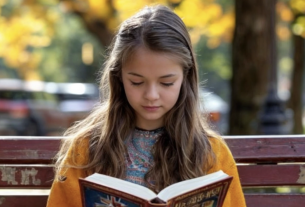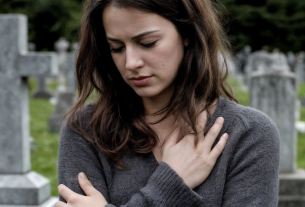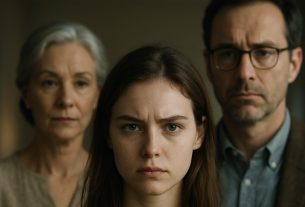A young and beautiful woman sat in her cozy office, thoughtfully staring ahead. Alena Kirillova slowly turned her head toward the mirror on the desk. As always — flawless. But under her eyes was fatigue, and no wonder: the last deal had been difficult. However, it ended successfully.
Yet Alena’s thoughts were far from business. Today she had received a message — an invitation to a school reunion. Ten years since graduation. And now she was wondering: should she go?
“Alena, on June 17 we have a class reunion. Attention: the fee is 5,000 rubles. We will sincerely be glad to see you. Venue to be announced later,” she read aloud, as if feeling every word, and absentmindedly glanced at the calendar.
“Has it really been ten years already?” she whispered, wiping away a rare tear.
But those were not tears of nostalgia. It was pain. Because school years for Alena were not a bright past, but the time of her hardest memories. Just the thought of them made her shrink as if from cold, though the office was warm.
“Fee of 5,000… We will be glad to see you” — a phrase that sounded almost mocking. Those very classmates who once mocked her poverty were now suddenly so “glad”? Alena bitterly smirked as she checked social media. She found Lida, the former “star” of the class, without difficulty. The page was private, but the photos were visible. Nothing special: she looked aged, as if life had drained everything out of her. And she was only twenty-seven.
So, to go or not to go? To be or not to be? Alena smiled. Most likely, the reunion would be held in some expensive restaurant. And then — why not give her former classmates a surprise? One they would remember for a lifetime. What exactly she planned — she didn’t know yet. But it would definitely be connected to her painful past. And to one person who once meant everything to her, and now… now he embodied her bitterest disappointment.
Unnoticed, as time seemed to stop, Alena immersed herself in memories she had tried to forget for years. But memory would not obey. Images of the past swirled before her eyes like scenes from an old film.
Few knew about Alena’s childhood. It was hard. And it all began with a tragedy that split her life into “before” and “after.” And the “before” turned out to be so short.
Her parents died in an accident. A drunk driver drove into the oncoming lane — and the collision was inevitable. Her father, Valery, died instantly. Her mother, Tatyana, miraculously survived but with severe injuries. Her face was mutilated by shards of the windshield, and she lost her sight. That day, little Alena was playing in the sandbox at kindergarten and did not even suspect that her father was gone and her mother was fighting for her life.
When Aunt Valya, her father’s sister, came for her, the girl timidly asked:
“Where is mom?”
“They haven’t arrived yet,” Aunt Valya answered, her voice trembling.
But Alena did not understand then that it was forever.
Tatyana, who had worked as a nurse before, became disabled. Eight years of work — and such injustice. When her daughter first saw her with an eye patch, she screamed. The patch looked too frightening.
“What can I give you now?” her mother wept.
Alena ran to her, hugged her, and whispered:
“Mommy, don’t cry. Everything will be fine.”
Since then, she never saw her mother’s tears. But at night, she heard her silent crying behind the closed door.
Later, when Alena grew up and became successful, her mother said:
“If it weren’t for you, I wouldn’t have survived.”
There was no one else to help. Tatyana had no family — she grew up in an orphanage. Valery’s parents lived far away, retired, and could not help. Aunt Valya visited but soon said:
“I need to build my own life. Sorry, girls.”
Although she saved Alena from the orphanage — and for that, Alena was grateful.
Sometimes the neighbor, Irina Vasilyevna, helped: cooking, cleaning, braiding hair. The girl learned early to take care of the house, her mother, and herself.
Now, at 27, strong, independent, and successful, Alena thought: “There would be no happiness if not for the misfortune.” But at the same time, she would gladly give up everything she had just to bring back her father and her mother’s health.
At school, Alena quickly became an honor student and helped classmates. But no one was in a hurry to accept her. The reason — poor clothing. The school uniform did not equalize everyone: shoes, outerwear, sportswear — all revealed her situation.
“Oh, a coat gifted to a beggar? Maybe we can get something too?” classmates laughed.
At first, these were silly jokes. Alena tried not to pay attention. She had more important matters — mother, lessons, work. But over time, the mockery grew crueler.
At the New Year’s party in sixth grade, Myzina sarcastically asked:
“Alenka, where did you get that ‘vintage’ dress?”
“In the trash,” Oksana giggled.
“No, in grandmother’s chest!” added Masha.
Besides, Alena was a bit plump — not fat, just big. Once a teacher, trying to praise her, said:
“A real Russian beauty, like in Vasnetsov’s paintings!”
But the kids heard only “big.” And immediately laughter burst out:
“Big Alenushka, little cow! Won’t fit in any painting!”
“Once upon a time there was an old man and an old woman, and they lived poorly…”
Alena pressed her lips to keep from crying. Because that was exactly what they wanted.
She understood: her clothes really left much to be desired. All from secondhand stores, sales, used. Even if a sack looked good on her — alas, it didn’t work.
“How’s school?” her mother asked.
“All good, mom.”
“And with classmates?”
Tatyana guessed. The girl wanted to be beautiful, but they had no money.
“Yes, we’re friends, we talk,” Alena answered.
But her mother felt the lie.
“Maybe I should try working?” suddenly said Tatyana. “At the society for the blind, they said people make jewelry, beads…”
Thus began their joint work. Alena helped her mother make costume jewelry and sold the items to stores. Irina Vasilyevna suggested selling at the market, but Alena refused:
“No, after school I have no strength left.”
In reality, she was afraid classmates might see her.
The income was modest, but at least some support. They lived in hunger, economizing on everything.
In eighth grade, Alena fell in love. Unrequited, as it should be. Her heart belonged to Igor — son of rich kids, a heartbreaker. He was with Lida, and Alena quietly suffered, dreaming of the park, hands, kisses, a ring, a wedding…
But it was only a dream. Reality was different. And the reunion could be the moment when past and present met face to face.
“What are you thinking about?” Lida’s mocking voice sounded. “The bell already rang.”
Next to her stood her faithful friends — Oksana and Masha, ready to pick up any jab.
The prom night was near, and Alena dreamed of it with trembling. She wanted to be beautiful. What if Igor, seeing her in a new dress, finally noticed her? Asked her to dance… And then — love, confession, maybe even a wedding… Dreams were always bright, but reality — cruel.
With the money earned from selling beads, Alena bought a modest but elegant dress. It suited her. And now she stood in the hallway trying to smile when suddenly…
“Well, you’re such a beggar!” Igor sneered, looking her up and down. “What’s that rag on you?”
Lida giggled nearby in a rich, glamorous outfit. Then the rest gathered — all present, ready for the spectacle.
“Guys, let’s take pictures!” Olga Ivanovna called out.
“Just don’t stand next to that rag,” snorted Oleg Kunitcin’s mother. “You’ll ruin every photo with your look.”
“How can anyone bring a child to such an event looking like that?” added another mother.
“Heard what people say, Onishchenko?” Igor mockingly said, looking at Alena.
“Rag!” someone shouted from the crowd.
Alena silently turned and left. Not a single word in her defense. Not one. She walked biting her lips, holding back tears, then wandered the city almost till morning. When she returned home, her mother quietly asked:
“How was the prom?”
“Everything was great,” Alena replied, smiling through tears.
At night she cried into her pillow. No one stood up for her. No one. At that moment, she swore to herself: the day would come — and they would remember. And regret.
And the miracle happened the very next day.
“Alenka, are you asleep?” her mother’s voice sounded.
“What happened?”
“They called from the art salon. Some rich man bought our jewelry. And even ordered more!”
Alena jumped out of bed.
“Really?!” she shouted and ran to hug her mother. “It’s a miracle!”
From that day, their life improved. Through the salon, they met George — Russian by origin but long living in America. Georgiy, as he was formerly called, was touched by Alena’s story.
“I will help you, girl,” he said. “I was poor too. But I made it. You will too.”
And he kept his word.
Today Alena is a successful entrepreneur, owner of two fashion stores in the capital. Her mother Tatyana had surgery — her sight partially returned. Life was getting better. And Alena, once called “big,” now proudly showed a slim figure honed by years of training with the best fitness coach.
Shaking off the heavy memories, she finally made a decision:
“I will go. And I will do it beautifully. I have waited too long.”
She would organize the reunion herself. Order the restaurant, banquet, music. Only left to find out where they were gathering.
The hall sparkled. Tables were bursting with delicacies, live music played, flowers, balloons, an exquisite festive atmosphere everywhere.
“Are you sure this is all for us?” Lida asked the administrator suspiciously.
“Of course,” smiled a slim brunette. “All paid for. Enjoy your evening!”
“Wow!” guests buzzed. “For five thousand — and this?!”
“We couldn’t even dream of this!”
“Only, our beggar is not here,” Olga noticed.
“So what?” smirked her husband, former classmate Oleg Kunitcin. “Does it bother you?”
“Just curious. Did she even respond?”
“She wrote, asked where the banquet would be. That’s all.”
“Probably scared to show up. Doubt anything has changed for her.”
“Maybe she’s sitting in her hovel in torn pants and envies.”
“Let her be.”
And at that moment, waiters began handing guests photos from the prom night. On the back of each photo was the inscription:
“Why am I not here?”
Guests exchanged glances. Silence hung over the hall.
“Beggar…” someone whispered.
“That’s her.”
And then a clear, ringing, confident voice sounded from the stage:
“Well, someone missed me?”
Everyone sharply turned. On stage stood a slender, elegant woman in a luxurious shimmering dress. It was her. Alena.
“Of course, I couldn’t not come,” she smiled. “Especially since part of the banquet is my gift to you. No need to thank me, I know how much you love freebies.”
She stepped down from the stage, slowly surveying the hall.
“I did a little investigation. And, oh miracle, it turned out: most of you, alas, have not achieved anything significant. Lida!” — she stopped in front of the former “star” of the class — “Could you really not take care of yourself? At our age?”
Lida blushed but remained silent.
Alena approached Igor. He stood with his head down. Teeth — darkened, receding hairline, belly, shortness of breath. After the death of his parents, he slid down, addicted to alcohol.
“Wait,” Alena said with feigned surprise, “what is a homeless person doing here? Who is this?.. Oh, Igor? Is that you? My God… Have you gotten hooked on something heavy?”
The hall fell silent. People lowered their eyes. The luxurious dinner suddenly seemed bitter.
Alena continued:
“To be fair, I should have kicked you out. Remember how you threw me out of the prom? But I won’t. I’ll leave myself. I try not to contact people from the lower social strata. Not out of spite — just lice, infections… Well, you understand. No offense, okay? It’s not your fault life broke you. Eat, drink, have fun. Unfortunately, there’s no cheap rotgut here, which you’re used to. But you’ll be served expensive cognac — try it, maybe you’ll like it.”
She smiled, turned, and left the hall.
Silence. Even the music stopped.
Alena didn’t look back. She walked through the main entrance, got into a black limousine, and disappeared into the night.
The past was behind her. She finally let it go. Not for revenge. But for herself.



